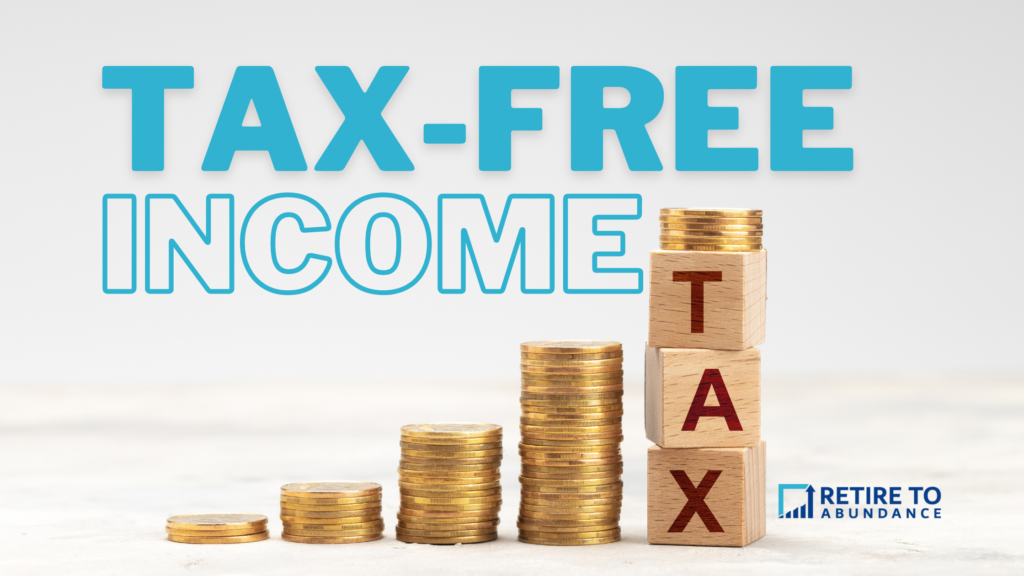Taxes are likely the single biggest expense you have in your lifetime. While complete tax avoidance is nearly impossible for middle to high income earners during their earning years, with careful planning streams of tax-free income can be created in retirement. By leveraging these options, you can significantly enhance your financial security all while lowering your tax bill at the same time. Let’s dive in and look at these four powerful strategies to create tax-free income in retirement.
Roth
Roth accounts can rightfully be considered the granddaddy of tax-free income planning. For the purpose of this blog, we are looping in all of the different types of Roth accounts a person may have (Roth IRA, Roth 401k, Roth 403b, etc.). Roth accounts can be a wonderful addition to almost every retirement account and have the added bonus of allowing Roth conversions from your tax deferred accounts. At a very basic level, Roth accounts allow you to put money in without any tax deduction and grow tax-free. The tax-free nature of it allows you to access this income in retirement without any taxes owed. There are several options to fund Roth accounts including both regular contributions as well as through conversions. Additionally, you essentially have unlimited options for investments inside of a Roth. These characteristics make these account types one of the most powerful tools in planning your retirement.

Municipal Bonds
Municipal bonds, often referred to as “munis,” are yet another option for tax-free income in retirement. When investors purchase municipal bonds, they are lending money to state or local governments to fund essential projects such as schools, roads, or other important infrastructure. What sets municipal bonds apart from other fixed income investments is the fact that no federal income tax is due on any interest earned. Additionally, if the investor resides in the same state as the issuing municipality, the interest earned is often exempt from state and local taxes as well. This tax-free status can significantly enhance the after-tax return on investment, particularly if the bondholder is in a high-income tax bracket. However, it’s important to note that while interest income may be tax-free, any capital gains realized from selling municipal bonds are subject to taxation. Nonetheless, the tax advantages of municipal bonds remain a valuable feature for those looking to minimize their tax burden in retirement.
Income Below the Standard Deduction
Maybe this is a “should have had a V-8” head slap moment, but this is a planning opportunity we’ve seen missed with several incoming clients. Each year a couple who files taxes as Married Filing Jointly has a standard deduction ($27,700 in 2023). In other words, the first $27,700 of income is not taxed. Many people also do not realize that if their income is low enough, then their Social Security will not be subject to taxes.
As a quick example, let’s look at Fred and Wilma Flintstone who have combined Social Security benefits of $3,000 per month and Wilma has a pension paying her $1,000 per month. While the calculation for whether your Social Security benefits are taxable is way more complicated than it should be (thank you congress!), in this example Fred and Wilma make a low enough income that their Social Security is not subject to taxation. Thus, their only income is the $12,000 paid to Wilma from her pension. This means that a $15,700 distribution can be made from Fred’s IRA and no taxes will be due as this just fills up the no tax threshold established by the standard deduction. If you have lower income years and tax-deferred money, you are missing a significant tax break if you are not realizing income at least up to the standard deduction.
Long Term Capital Gains Below $89,250 ($44,625 for Single Filers)
As the title suggests, there is no tax due on long-term capital gains if your total income is below $89,250. I remember learning about this strategy many years ago as I was studying for one of my certifications and thinking, “Wow, this is an incredibly powerful strategy, and many people have no idea this exists.” To really understand the benefit, you first need to understand what a long-term capital gain is.
The tax code defines capital gain as a profit made on an investment sold. Capital gains are split into two categories, short-term – a profit made where the investment is held for less than a year, and long-term – a profit made where the investment is held longer than a year. It is important to note that capital gains do not apply to retirement accounts however, but instead apply to non-qualified investment accounts.
Now that we have laid that groundwork, let’s take a look at how George and Jane Jetson use this strategy to save big on taxes. In October, George and Jane meet with their financial planner and realize that their total income for the year is going to be $40k. This is great news as several years ago, George purchased stock in a flying car company for $10k that is now worth $100k. Since their income is only $40k, that leaves room for nearly $50k of long-term capital gains that are not subject to taxation. For this reason, George decides to sell half of his stock. The total sale was for a value of $50k. To figure out what the capital gain was, we need to take the sales price and subtract out the original purchase price (the original purchase price is called the basis). Since $50k represents half of the position, then we can use half of the basis, or $5k for this calculation. $50k less the basis of $5k leads to a long-term capital gain of $45k. Since this long-term capital gain plus other income for the year is less than $89,250 this transaction is not subject to taxation.

Don’t Leave Uncle Sam a Tip
As you can see there can be many strategies to minimize your taxes within retirement. There really is no silver bullet when it comes to tax-planning, rather you must take a death by a thousand paper cuts approach. For most people, tax savings are realized by utilizing multiple strategies which in aggregate can lead to some very meaningful tax dollars saved. While you should certainly pay every dollar of taxes owed, I see it as my responsibility to utilize my knowledge of the tax code to make that amount as small as legally possible. If you are interested in keeping more of your hard-earned dollars working for you, a Retirement Assessment can ensure you aren’t leaving good ol’ Uncle Sam a tip.
This post is for educational and entertainment purposes only. Nothing should be construed as investment, tax, or legal advice.

